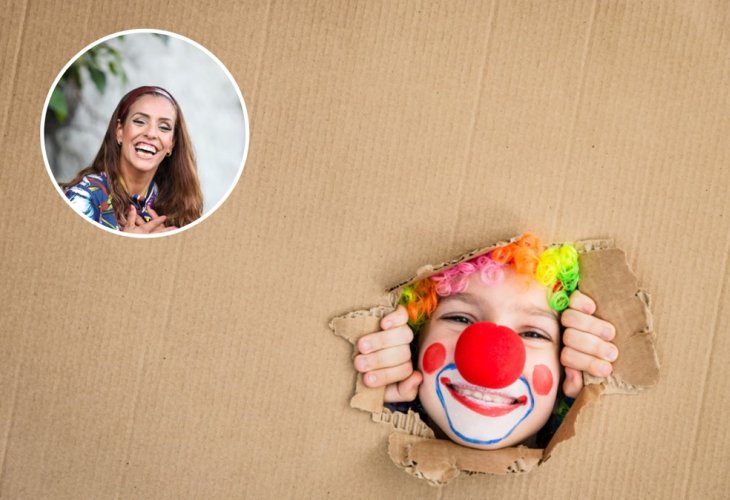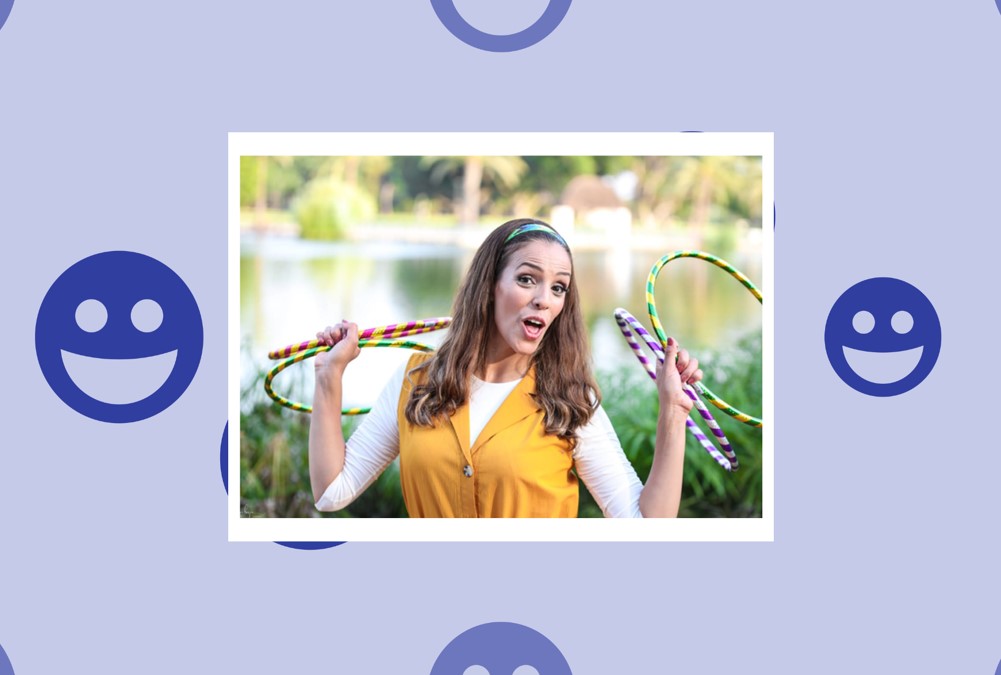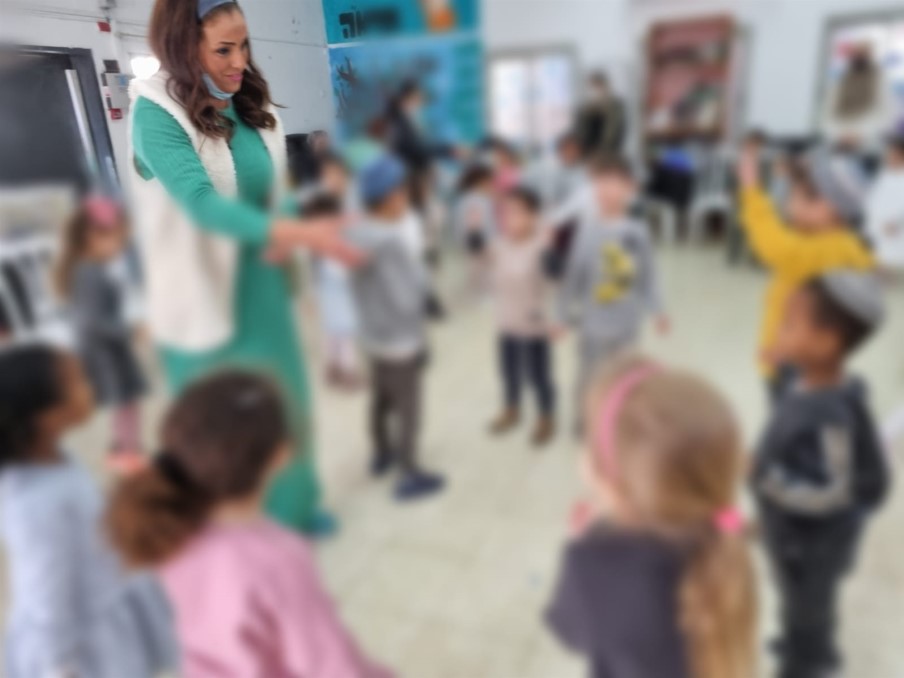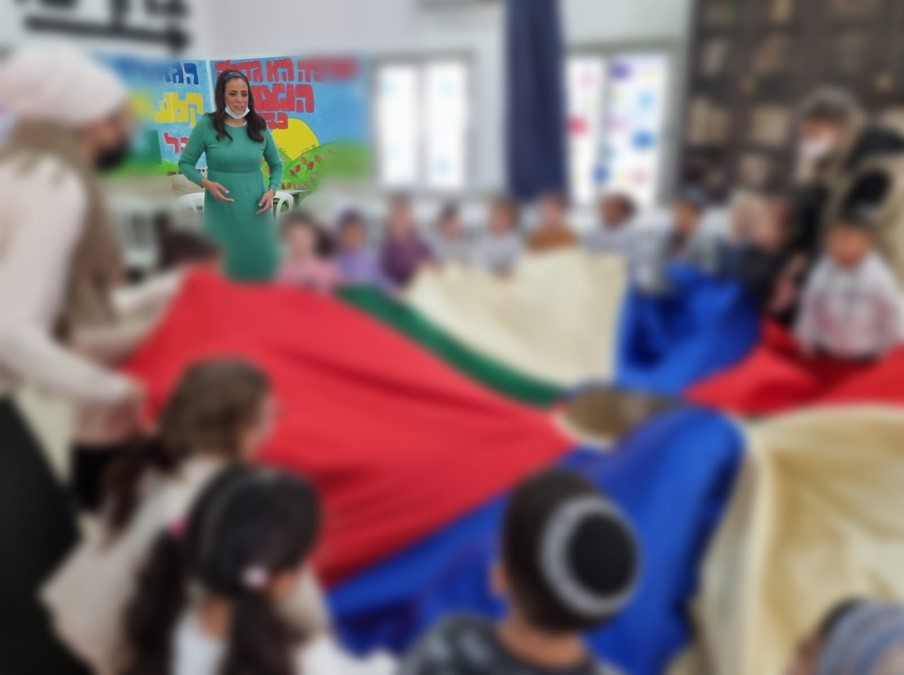"People Think That If I Lead Laughter Workshops, I Don't Have Sorrows in Life"
Discover how one rebbetzin was the only one able to make her laugh, tips on maintaining happiness even after meeting the toughest patients, and practical advice to uplift your spirits. Meital Azani, a laughter workshop facilitator and medical clown, reveals her professional secrets just in time for Purim.
 (Background: Shutterstock, Inset: Meital Azani, Photo: Shiri Kagan)
(Background: Shutterstock, Inset: Meital Azani, Photo: Shiri Kagan)"A while back, someone I knew called me. Her father, an important admor in Bnei Brak, was very unwell, and her mother was deeply saddened, seemingly beyond help. She asked if I could urgently come to their home to conduct a laughter workshop for the family, hoping it might help," recalls Meital Azani.
"By the end of the session, she couldn't stop laughing. Later, they requested that I visit once a week to make her laugh until this phase passed. Can you imagine? Every week, this Yemenite would go to a large courtyard filled with Ashkenazi chassidim," she laughs, "solely to bring joy to this dear rebbetzin... I would sit with her until she was in stitches, and it worked. I felt how joy simply revived her. Because there's nothing like joy; it's the cure-all."
Azani (39) has been leading laughter workshops, incorporating hafrashat challah for over ten years and recently became a medical clown. Both fields share a significant mission for her: to bring happiness to people.
 Photo: Shiri Kagan Background: Shutterstock
Photo: Shiri Kagan Background: Shutterstock"Originally, I studied early childhood education, and that was my main occupation. But people always said I was really an actress. I always stood out as the life of the party and never thought it would become a profession. After having my third daughter, I decided to pursue a dream and studied laughter workshops, and since then, I've been endlessly accompanying those who wish to bring joy into their lives. I thought I had ADHD, but I realized it was a rhythm and dance disturbance. It's not a disorder; it's a surprise," she laughs.
What exactly is a laughter workshop?
"A laughter workshop is simply about practicing joy with women and helping them discover the joy within. Initially, women look at me in shock; it seems insane to laugh forcibly, but I lead them through various laughter exercises and say: 'It's better to be a happy madman than a sad normal person.' How does one step out of sadness? By stepping out of oneself. Sometimes you have to take external actions to reawaken it: jump, clap to sweeten harsh decrees, as Rabbi Nachman says. Actions lead the heart. On the other hand, we must understand that we are our own source of joy and truly need no external stimuli."
"In the past, people had natural joy, and today it fades away. If we look at it, children laugh on average 300-400 times a day, while adults only 30-50 times. As we grow, we enter life's pain and challenges, and without realizing it, become more cynical, forgetting to nurture the place of joy within us."
 Photo: Shiri Kagan
Photo: Shiri KaganWhen I ask her about an emotional story of the power of joy, she struggles to choose. From a family where one sister passed away, leading the others into sadness and distance until they joined a laughter release that restored unity and life to the home, to a 45-year-old single woman. When she rediscovered her joy, her intended arrived; a woman needing complex surgery decided to prepare through a laughter workshop with friends; and a mother and daughter who participated in a workshop just as the mother was diagnosed with a disease, reminding each other of the workshop's content throughout their journey, breaking into laughter together. The list goes on.
The Cobbler's Children Go Unshod
"People tell me: 'Well, it's easy for you to be happy; it comes naturally to you,'" she describes. But behind the scenes, Meital also faces significant life challenges she fights to overcome. "I'm a single mother raising four daughters on my own. They may be sweet, but every day is a struggle in many ways. Every day, I choose joy, not as a cliché. I choose to hold onto faith. Without faith, one could go crazy. I have tough days, yet I enter the hardest ones with drive, going out to bring joy to other women, strengthen and encourage them that you can rise from anywhere. I see what my choice does to those around me. Just open the window and smile at others; you have no idea how much you change their lives. I train myself to look people in the eyes and say a good word. As it's written: 'Happy is the person who whitens their friend's teeth more than gives them milk.' I love that. NACHAT stands for Breathing, Smiling, and Thankfulness. This, in my view, is my mission: to go everywhere and generate love, to give thanks."
 Photo: Shiri Kagan
Photo: Shiri KaganWhat helps you stay cheerful? Perhaps you could share some tips that help you, which anyone can apply independently.
"I think we have a thousand reasons to fall into sadness at any moment, and there lies our true choice. I wake up in the morning and try to look in the mirror and smile immediately. A smile is the 'button' to joy because when we make the smiling motion, the brain, which doesn't distinguish between a real or fake smile, immediately releases endorphins that improve our mood and how we feel."
"Besides that, I strongly believe in the power of speech and thought. For example, HACHAM stands for Half Cup Full, meaning a wise person chooses to see what is there and not what is missing. Speak faith, offer a kind word, like a compliment, not criticism, from the word chill."
"When necessary, act actively: clap, play happy music. Ben Ish Chai writes that 'bringing laughter to a home eradicates diseases and harm.' In tough moments, I also employ the 'Tuli Method': Smile, Breathe, and Relax. That means, smile, raise your hands high, take a deep breath, lower your hands, and relax. I extensively use imagination too. Hashem gifted us with imagination to envision things differently, so we're not always in pain."
It sounds like with the joy you wish to spread, you also encounter much pain. How do you handle it? How do you remain untouched?
"It's true, there are moments it's not easy. I sometimes visit hospitals and challenging wards. I see a lot of suffering, especially among young children. For instance, a year ago, Zichron Menachem invited me to bring joy to children with cancer at Haemek Hospital in Afula. Is it easy to face this? No, but I draw lines. Here, my acting skills protect me; that’s why I enter as Tuli the clown, not Meital, which helps me create internal boundaries. To me, maintaining joy requires creativity. Knowing how to guide your emotions, develop your imagination, and let go of some control. Only after we learn to release and ease the burden can we truly cope."
"Additionally, we must remember that we're here for 60-80 years, and everything is temporary. Even the toughest situations pass. I know a child who, at one year old, accidentally drank toxic Sano Moritz, a grease remover, and spent four years hospitalized. Difficult? Yes. Painful? Certainly. But it was also temporary. Nothing lasts forever. We should focus on our daily mission, and remember that 'the whole world is a very narrow bridge, and the main thing is not to fear at all.' Life here is not the main event; it's merely an antechamber."
Do you feel your life has changed since engaging in this work?
"Without a doubt. It's a deep mental shift I first apply to myself. We're used to waiting for someone to make us happy, which is a mistake. It's all an internal choice. It's like two people in prison; one sees the barbed wire around and cries, while the other revels in the blue sky above him."
"Our life is sweet, which stands for Thank Day, Thank You, and Thank You Again. I live by this. Are you sad at this moment? Make the next moment the happiest, getting up is what matters. Choose life every moment, be happy, smile. Action leads the heart. Just as I smile from below – they will smile at us from above. I firmly believe Hashem gives us the strength to cope with every reality."
"King David is the figure who gives me the most strength. What hasn't he endured? Hell on earth; grew up alone in the forests, and even when he became king, his own son fought him, wanting to kill him. Yet he was never sad; he composed all of Psalms from his struggles, with divine inspiration. Our sages reveal that divine inspiration cannot rest upon a person in sadness."
"Finally, I'll share a story that deeply touched me: Once in a while, I join a group of medical clowns to bring joy to hospital patients at 'Shaarei Zedek.' One time, I went to cheer up a ward of critically ill patients, and there was a young man, paralyzed, injured in a motorcycle accident, eating only through a throat tube. When I saw him, I was amazed; he had such a huge smile on his face; he was full of joy! You don't understand what it did to me, what strength his joy gave me! It taught me the most profound lesson I try to convey to the women I meet: it doesn't matter what situation you're in – what matters is what thought goes through your mind. Hashem decides the situation – and we decide the mood."

